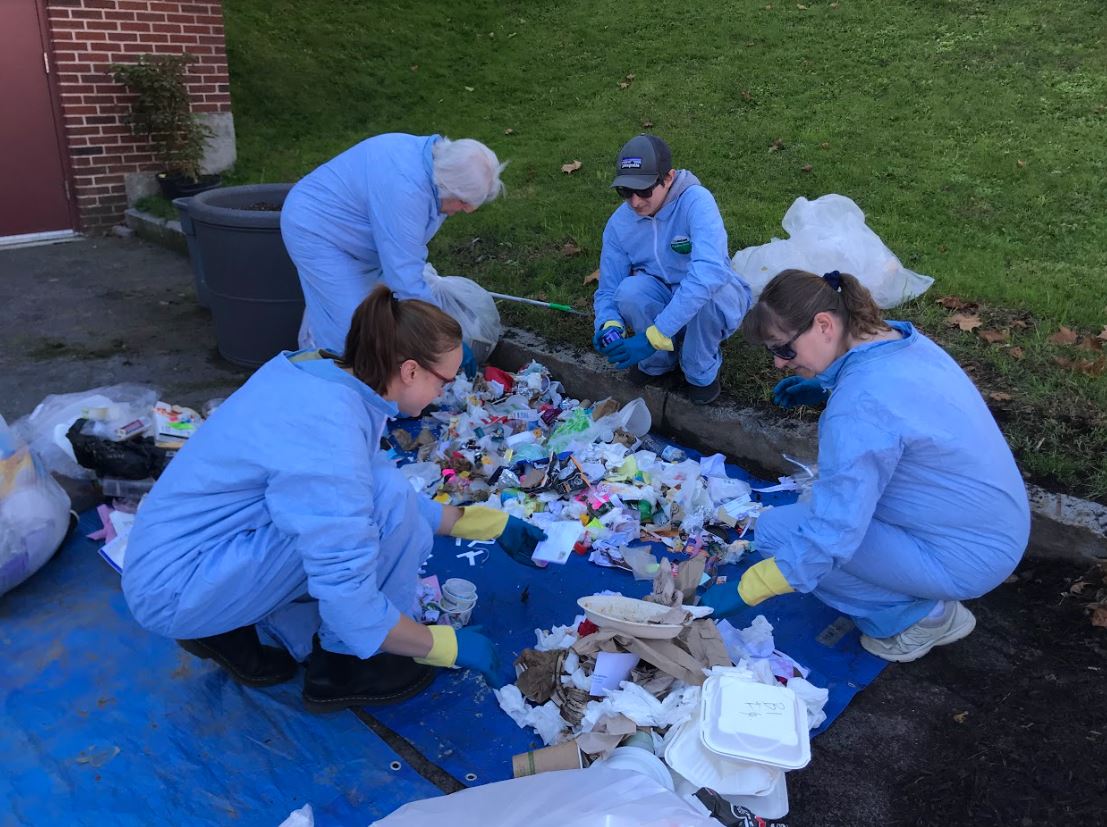Sustainability at ESF
Total Resource Use & Efficiency (TRUE)
TRUE
TRUE, a program administered by GBCI, is a zero waste certification program dedicated to measuring, improving and recognizing zero waste performance. It serves as a complement to the LEED green building rating system created by the USGBC.
ESF is pursing True Precertification across its Syracuse campus as a Portfolio. Precertification is an optional, incremental pathway to TRUE certification that prioritizes the core actions essential to getting a successful start toward zero waste. Learn more about the process by reviewing the TRUE Precertification Guidance. It is our hope that we will obtain TRUE Certification across all ESF campuses one day.
This very difficult to achieve certification necessitates a diversion (recycling and composting) rate of 90%. Visit Zero Waste & Circularity for more information about our zero waste and circularity programs in general.
TRUE Precertification Quick Reference and Progress
- MPR 1: Have a zero waste policy in place.
- ESF policies in place include Green Purchasing & Break Free From Plastic Policy and Sustainable Facilities Maintenance & Renovation Policy. Separate zero waste policy to be developed and adopted.
- MPR2: No minimum diversion rate required for precertification. (90% required for certification).
Report diversion rate.
- Syracuse campus diversion rate in 2022 was 59% (not including C&D)
- MPR3: Meet federal, state and local solid waste and recycling laws and regulations. Comply
with all air, water and land discharge permits required for collection, processing
and handling of materials.
- ESF meets all federal, state and local laws applicable.
- MPR4: Document year of baseline waste data and measurements since the base year, adjusted
for changes in size, type and nature of business.
- ESF's baseline year is calendar year 2018. Detailed, campus level data is available from 2018-2022. View this data by visiting our Materials & Purchasing impact area page.
- MPR5: Compliance with contamination standard is not required until certification. (May not
exceed 10% contamination for any material leaving site)
- Need to explore how to track contamination rates for all streams. Hauler has never alerted ESF of any problems related to contamination.
- Redesign Credit 1: Conduct service frequency and bin right size evaluation.
- Complete! ESF conducted an interior bin audit during the summer of 2019 and as a result, standardized bins and educational signage across the Syracuse campus. Trash collection was reduced from 5 days a week to 2 during the academic year and to 1 day a week during the summer.
- Redesign Credit 2: Review all 9 points of generation.
- Need to review applicable points of generation: offices, food services, grounds, construction, vehicular maintenance and retail).
- Purchasing Credit 1: Adopt environmentally preferred purchasing policy or guideline or indicate strategy
for how this will be done.
- Complete! Check out our Green Purchasing & Break Free From Plastic Policy and associated Green Purchasing Guide.
- Leadership Credit 1: Adopt zero waste goal at upper management level.
- Yet to be done, but College leadership is very receptive
- Training Credit 1: Provide zero waste goal/policy training to all employees.
- Partially complete. Grounds and custodial staff recieve zero waste training multiple times a year and all p-card holders recieve green purchasing training.
- Zero Waste Analysis Credit 1: Complete annual physical waste audit.
- Complete. The Mighty Oak Student Assembly's SustainabiliTEAM conducts monthly trash and recycling audits during the academic year. ESF staff conducted trash and recycling audits during Fall 2022. These audits will continue into the future, occurring once per academic semester. Centennial Hall EcoReps also conduct trash and recycling audits in the dorm multiple times a year.
- Zero Waste Analysis Credit 2: Analyze results of annual waste audit data.
- Complete. Results are analyzed by students and staff .
- Zero Waste Analysis Credit 3: Complete annual physical audit of recyclables.
- Complete. The Mighty Oak Student Assembly's SustainabiliTEAM conducts monthly trash and recycling audits during the academic year. Beginning in Fall 2022, optional staff trash and recycling audits will take place three times a year. Centennial Hall EcoReps also conduct trash and recycling audits in the dorm multiple times a year.
- Hazardous Waste Prevention Credit 1: Properly handle hazardous materials
- Complete. Environmental Health and Safety conducts audits and recommends corrective action, where needed, to facilities and operations staff.
 ESF staff and student volunteers sift through trash during a Fall 2022 audit
ESF staff and student volunteers sift through trash during a Fall 2022 audit
